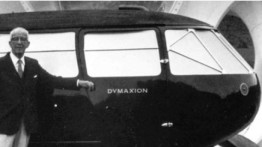Announcing a Collaborative Partnership between the Institute for Sustainable Design and the Buckminster Fuller Institute
POSTED ON: March 26, 2013

The Cooper Union Institute for Sustainable Design is extremely pleased to announce that it has begun a collaborative programming partnership with the Buckminster Fuller Institute. The Buckminster Fuller Institute is dedicated to accelerating the development and deployment of solutions for the most pressing problems facing humanity and the planet, and it pursues this goal through a variety of programs that encourage the collaboration and cross-pollination of different disciplines.
Collaboration between the two institutes is a very natural fit. Both are engaged in the work of advancing human well-being, fostering the health of our planet’s ecosystems, designing practical strategies to ensure that our social systems and ecosystems strengthen one another, and showcasing work that details the connection between environmental sustainability and collective intelligence. This partnership will allow both institutes to pursue their missions with greater intensity, consideration, and connections to on-the-ground developments in the field of sustainable design.
We are happy to be embarking on this collaboration and look forward to what will undoubtedly be its socially beneficial and intellectually broadening results. We look forward to seeing you at our events!




